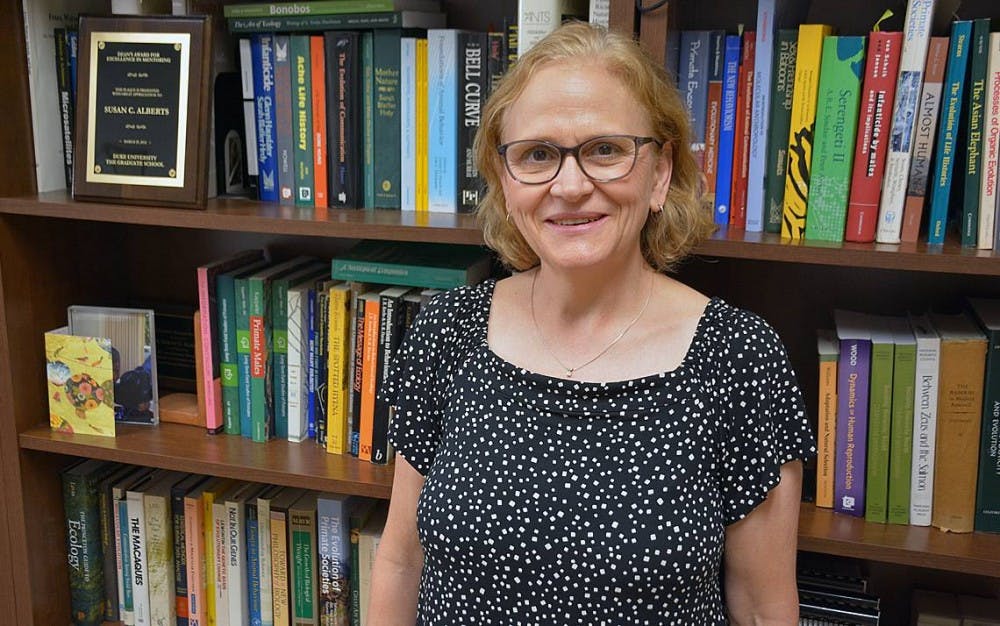Susan Alberts, Robert F. Durden professor of biology at Duke and the Chair of Evolutionary Anthropology, has recently received the 2019 Distinguished Primatologist Award from the American Society of Primatologists. A behavioral ecologist and evolutionary biologist by trade, Alberts has dedicated decades of research to the study of the Amboseli baboons, found in the Amboseli basin in southern Kenya. The Chronicle spoke with Alberts about the intricacies of her work, what it means for understanding human behavior and what receiving such an award means to her. This interview has been edited for length and clarity.
The Chronicle: What have you been studying about the behavior of baboons in the Amboseli basin all these years?
Susan Alberts: We’re really interested in how animals use behavior to solve the problems of their environment. Some of those problems are the abiotic environment, some with the biotic environment and some with conspecifics, or dangerous and cooperative interactions within the population or species. You can think of behavior as a flexible sheath around the animal that allows it to respond really rapidly in real time, to opportunities and challenges. We’ve done a lot of work to see how animals deploy behavior to solve these problems.
TC: Do you have any interesting examples?
SA: One of my favorite examples is, so, baboons live in populations that are subdivided into relatively stable social groups impermeable to females and relatively permeable to males, meaning males will move between groups. The canonical social group of baboons usually consists of sets of female relatives and then clusters of unrelated males. Within social groups, females mate with multiple males, making offspring paternity unclear. It has been assumed for decades that males can’t differentiate their own offspring from others’, leading to the assumption that male baboons just don’t provide paternal care. We discovered in 2003 that male baboons do in fact differentiate their own offspring and they do provide care to them, a characteristic which many researchers have gone on to see in other populations and primate species.
TC: What led you to your interest in baboons?
SA: It was when I was a senior in college—I knew I wanted to go to the field and study primates. I was already really interested in the way baboons used behavior, specifically social behavior, to solve the problems that their environment presents to them. So, I wrote to a number of people who studied primates in the wild and asked if I could talk more to them about going to their field site. The person who has been my collaborator since that day, Jeanne Altmann, allowed me to get started in this field. She was like the Jane Goodall of Baboons, and I was her disciple.
TC: Do you feel that the primatology and evolutionary anthropology field is growing?
SA: The way I would put it is that the boundaries between disciplines are becoming less important and blurrier. It’s definitely growing in the sense that it’s connecting to a lot more disciplines, and one of the great things about being at Duke is how interdisciplinary Duke is and how the boundaries between disciplines are already pretty low. A lot of the work that I do already connects to what people are doing in the sociology department in humans, and also connects to work that people in biology do in evolutionary ecology of other organisms.
TC: Given the interdisciplinary nature of evolutionary anthropology, how does the work you do inform our understanding of human behavior?
SA: One of the things that I’m very interested in is the ways in which studying the social and behavioral processes of non-human primates can fill the gaps in our understanding of human behavior. For example, we found in a study published in 2014 that female baboons that have more frequent affiliation with other females actually live longer than females that are more socially isolated. In humans, we have found that social affiliation is also linked to survival. The stronger your social bonds, the better you survive after heart surgery and the more likely you are to live a long life. The fact that this occurs in multiple other species suggests that there are potentially deep evolutionary roots in this phenomenon.
TC: How might the role of primatologists and behavioral ecologists shift as primate species around the world become threatened by human activities?
SA: Many primatologists have increasingly understood that they have to expand their mission beyond basic science to conservation. Increasingly, people who have long-term studies like ours are very much confronted with the reality that the primate populations they study are often in conflict with humans or are being pushed or crushed by humans. When you work in areas where the indigenous human populations are growing but also suffering, as a human your priority has to be reducing human suffering, but trying to balance that with conservation is a big part of a lot of people’s work. In my case, baboons are not a threatened species, but we certainly work very closely with the human community around our study population to help mitigate human-animal conflict and to keep the people in the community invested in our research.
TC: What does receiving a lifetime award like this feel like in terms of validating your work?
SA: I think what scientists get awards for, or the way I think it should be, is what you might call paying it forward. I’ve had a lot of luck in my life and my goal has been to make sure that I use that luck to the utmost—that I take advantage of my opportunities, to generate knowledge, to be generous and to pay it forward. That’s how I’m taking this award.
Get The Chronicle straight to your inbox
Signup for our weekly newsletter. Cancel at any time.

